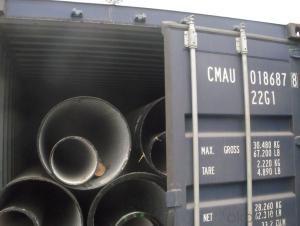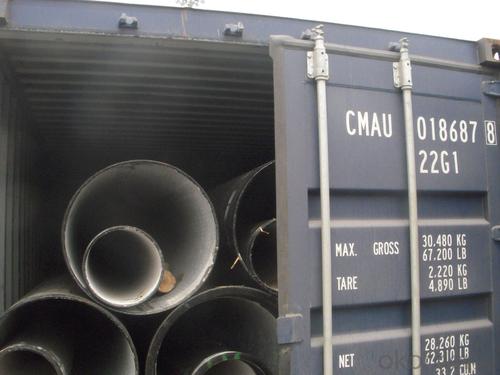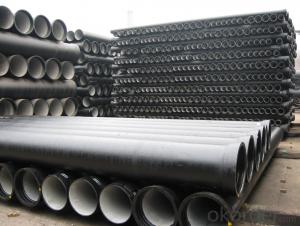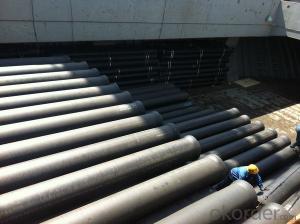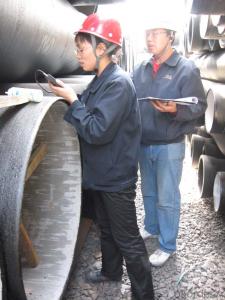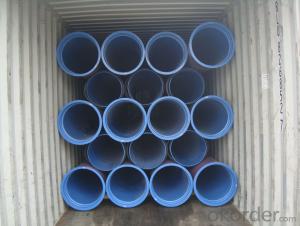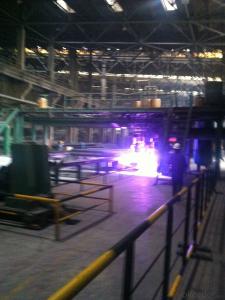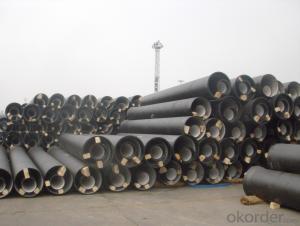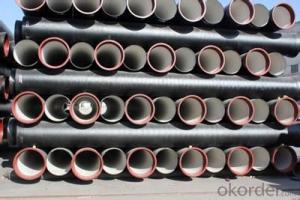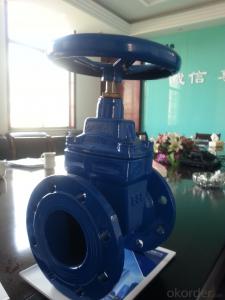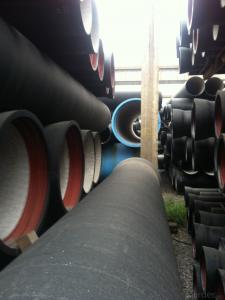DUCTILE IRON PIPES AND PIPE FITTINGSk8 CLASS DN1700
- Loading Port:
- Tianjin
- Payment Terms:
- TT OR LC
- Min Order Qty:
- 22 pc
- Supply Capability:
- 3000 pc/month
OKorder Service Pledge
OKorder Financial Service
You Might Also Like
Material : Ductile Cast Iron
Size Range : DN 80mm to DN 2000mm
Unit Effective Length : 6m or 5.7m
Manufacture Standard: ISO 2531:1998/ EN 545:2006/EN 598:2007
Annual capacity : 200,000 tons
Coating Exterior: Zinc 130g/m2 according to ISO 8179-1 and bitumen coating 70 microns.
Cement Interior: Portland Cement/ High Alumina Cement/ Sulphate Resisting Cement Lining according to ISO 4179
Special requirements on external coating and internal lining can be applied
We also provide accessories such as SBR/EPDM rubber gaskets, lubricant paste, pipe caps, PE sleeves, etc.
Additional Parts:
Each pipe is strictly inspected according to related standard to ensure permanently high performance.
Easy Installation at site and service free for life
Long Service Lifespan
Quotation will arrive you within 24hours once we get your inquiry.
We guarantee offering you a competitive price.
A copy of original inspection reports of pipes will be offered after shipment.
Photos of loading process will be sent to the customer after shipment effect.
We will follow-up the delivery progress after shipment effect and update to the customer on weekly basis.
- Q: What is the minimum pipe diameter of cast iron pipe?
- Cast iron pipe: cast pipe made of cast iron. Cast iron pipes are used for water supply, drainage and gas transmission lines. They include cast iron pipes and pipe fittings. Labor intensity is small.
- Q: Do ductile iron pipes require additional protection against external factors?
- Yes, ductile iron pipes do require additional protection against external factors. While ductile iron is known for its strength and durability, it is still susceptible to corrosion and other external threats that can lead to pipe failure. One of the main external factors that ductile iron pipes need protection from is corrosion. Corrosion can occur due to the presence of certain chemicals in soil or water, and it can weaken the pipe over time. To protect against corrosion, ductile iron pipes are often coated with an external protective layer such as polyethylene or zinc. This coating acts as a barrier between the pipe and the corrosive elements, extending the lifespan of the pipe. In addition to corrosion, ductile iron pipes may also require protection against physical damage. These pipes are typically buried underground, making them vulnerable to external forces such as heavy machinery, ground movement, or even vandalism. To safeguard against physical damage, ductile iron pipes can be encased in concrete or surrounded by a protective sleeve or casing. Furthermore, ductile iron pipes may need protection against soil conditions that could potentially cause pipe movement or shifting. In areas with unstable soil, additional measures such as proper bedding and backfilling techniques, as well as the use of anchoring devices, may be necessary to ensure the stability and integrity of the pipes. In summary, while ductile iron pipes are robust, they still require additional protection against external factors. This can include corrosion protection, physical damage prevention, and measures to address soil conditions. By implementing these protective measures, the lifespan and performance of ductile iron pipes can be significantly extended, ensuring the reliable conveyance of water and other fluids.
- Q: How long is the service life of the cast iron pipe, and the time of use of ductile iron pipes?
- When it comes to the service life of nodular cast iron, its maintenance is essential for its long service life. Then, the focus of the maintenance of ductile iron pipe is to pay special attention to, will affect the long-term use of ductile iron pipes, stable operation of socket, row, etc., we should make efforts to these aspects of the mouth without debris. Make sure that the rubber ring of the ductile iron pipe has been smashed with a rubber hammer, and it is not twisted or twisted, and it is uniformly stuck in the slot. Ductile iron pipe in the maintenance process, because of the pneumatic tube axis is buried into the ground, so in the face of a tilt angle of the time, we must be careful, if the resistance is too large, will not force the excavation, in order to prevent the distortion of the rubber ring.
- Q: What does ductile iron pipe "K" mean?
- The higher the K level, the better the quality, and the national standard requires K9
- Q: What are the different types of thrust restraints for ductile iron pipe?
- There are several different types of thrust restraints that can be used for ductile iron pipe installations. These thrust restraints are designed to prevent the pipe from moving or separating under the forces generated by internal pressure, external loads, or changes in temperature. 1. Thrust blocks: Thrust blocks are concrete structures that are typically installed at bends, tees, and other changes in direction in the pipeline. They are designed to resist the thrust forces by transferring them to the surrounding soil or foundation. 2. Mechanical restraints: Mechanical restraints, such as tie rods or harnesses, are used to restrain the pipe by exerting an external force on it. These restraints are typically made of steel and can be adjusted to accommodate changes in pipe length or alignment. 3. Pipe anchors: Pipe anchors are devices that are installed at specific intervals along the pipeline to provide resistance against axial movement. They are usually made of steel and are embedded into the surrounding soil or concrete to provide a secure anchor point for the pipe. 4. Thrust collars: Thrust collars are devices that are installed around the pipe to prevent it from moving or separating. They are typically made of steel and are placed at strategic locations along the pipeline to absorb the thrust forces. 5. Restrained joint systems: Restrained joint systems are specialized pipe joints that are designed to resist axial forces. These joints typically have additional features, such as keyways or wedges, that provide resistance against movement. It is important to select the appropriate type of thrust restraint based on the specific requirements of the ductile iron pipe installation. Factors such as the pipe diameter, operating pressure, soil conditions, and potential external loads should be considered when determining the most suitable thrust restraint system. Consulting with a qualified engineer or pipe manufacturer can help ensure the proper selection and installation of thrust restraints for ductile iron pipe.
- Q: What is the difference between flexible joint mechanism and seismic cast iron pipe DN100 and ductile iron pipe?
- Nodular cast iron has high strength and strong plasticity. The tensile strength of ductile iron is twice that of gray iron, and the yield strength even exceeds that of cast steel.
- Q: Can ductile iron pipe be used for municipal water supply?
- Yes, ductile iron pipe can be used for municipal water supply. Ductile iron pipe has excellent strength and durability, making it suitable for carrying the high-pressure water supply required for municipal systems. Additionally, its corrosion resistance and long lifespan make it a reliable choice for transporting water in urban areas.
- Q: What are the different types of linings available for ductile iron pipe?
- There are several different types of linings available for ductile iron pipe, each with its own advantages and applications. 1. Cement mortar lining: This is one of the most common linings used for ductile iron pipes. It consists of a layer of cement mortar applied to the interior surface of the pipe. Cement mortar lining provides excellent resistance to corrosion and chemical attack, making it suitable for a wide range of applications, including potable water distribution, wastewater conveyance, and industrial pipelines. It also helps to reduce friction and turbulence within the pipe, improving flow efficiency. 2. Polyethylene lining: Polyethylene linings are often used in ductile iron pipes for applications where corrosion resistance is a primary concern. This lining consists of a layer of high-density polyethylene (HDPE) that is either extruded or sprayed onto the pipe's inner surface. Polyethylene lining provides superior resistance to corrosion, abrasion, and chemical attack, making it ideal for transporting aggressive fluids, such as saltwater, chemicals, or industrial waste. 3. Polyurethane lining: Polyurethane linings are commonly used in ductile iron pipes for applications where enhanced protection against abrasive wear is required. This lining is formed by spraying or pouring a layer of polyurethane onto the inner surface of the pipe. Polyurethane lining offers excellent resistance to abrasion, impact, and chemical attack, making it suitable for conveying abrasive slurries, mining applications, and other high-wear environments. 4. Epoxy lining: Epoxy linings are applied to ductile iron pipes to provide a protective barrier against corrosion and chemical attack. This lining is typically formed by applying a layer of epoxy resin to the pipe's inner surface through a process known as centrifugal casting or electrostatic spraying. Epoxy lining offers excellent adhesion and resistance to corrosion, making it suitable for various applications, including potable water distribution, wastewater treatment, and industrial pipelines. 5. Zinc lining: Zinc linings are used in ductile iron pipes to provide cathodic protection against corrosion. This lining involves applying a layer of zinc to the pipe's inner surface, either through hot-dip galvanizing or by electroplating. Zinc lining acts as a sacrificial anode, corroding preferentially to the iron pipe and protecting it from corrosion. It is commonly used in applications where the pipe is exposed to highly corrosive environments, such as seawater or acidic soils. Overall, the choice of lining for ductile iron pipes depends on the specific requirements of the application, including the type of fluid being transported, the level of corrosion resistance needed, and the potential for abrasive wear. Consulting with industry experts and considering factors such as cost, longevity, and maintenance requirements can help determine the most suitable lining option for a particular project.
- Q: What is the expected corrosion rate of ductile iron pipes?
- The expected corrosion rate of ductile iron pipes can vary depending on various factors such as the environment, water chemistry, and protective coatings. However, on average, ductile iron pipes typically have a corrosion rate of around 0.1 to 0.5 millimeters per year.
- Q: How do ductile iron pipes compare to PVC pipes?
- Ductile iron pipes are generally stronger and more durable compared to PVC pipes. They have a higher tensile strength and can withstand higher pressure, making them suitable for more demanding applications such as water mains and sewer lines. PVC pipes, on the other hand, are lightweight, easy to install, and resistant to corrosion, making them a popular choice for household plumbing and irrigation systems. Ultimately, the choice between ductile iron and PVC pipes depends on the specific needs and requirements of the project.
Send your message to us
DUCTILE IRON PIPES AND PIPE FITTINGSk8 CLASS DN1700
- Loading Port:
- Tianjin
- Payment Terms:
- TT OR LC
- Min Order Qty:
- 22 pc
- Supply Capability:
- 3000 pc/month
OKorder Service Pledge
OKorder Financial Service
Similar products
Hot products
Hot Searches
Related keywords
